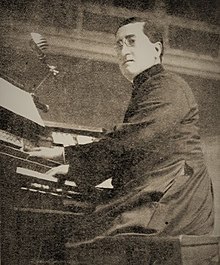| The topic of this article may not meet Misplaced Pages's general notability guideline. Please help to demonstrate the notability of the topic by citing reliable secondary sources that are independent of the topic and provide significant coverage of it beyond a mere trivial mention. If notability cannot be shown, the article is likely to be merged, redirected, or deleted. Find sources: "Raffaele Manari" – news · newspapers · books · scholar · JSTOR (October 2023) (Learn how and when to remove this message) |

Raffaele Manari (April 21, 1887, Carsoli – April 21, 1933, Rome) was an Italian priest, organist, and composer.
Biography
He studied under the guidance of Raffaele Casimiri and, especially regarding the organ, with Remigio Renzi. He was one of the founders of the Pontifical Institute of Sacred Music in Rome, where he designed and inaugurated the grand Mascioni opus 438 organ. Among his students, notable ones include Ferruccio Vignanelli and Fernando Germani. From 1920 until his death, he served as the organist at the Basilica of St. John Lateran. He was one of the main proponents of the so-called Cecilian Movement.
Works
- Fantasia siciliana
- Concert Etude on the "Salve Regina"
- Leggenda e Scherzo
External links
References
- Pfitzinger, Scott (2017-03-01). Composer Genealogies: A Compendium of Composers, Their Teachers, and Their Students. Rowman & Littlefield. ISBN 978-1-4422-7225-5.
- "Raffaele Manari da Carsoli". 2009-01-15. Archived from the original on 2016-08-16. Retrieved 2023-10-06.
- Confinelive, Redazione (2015-12-27). "Cerimonia a Carsoli; intitolata a Mons. Raffaele Manari la piazzetta di via Roma" (in Italian). Retrieved 2023-10-06.